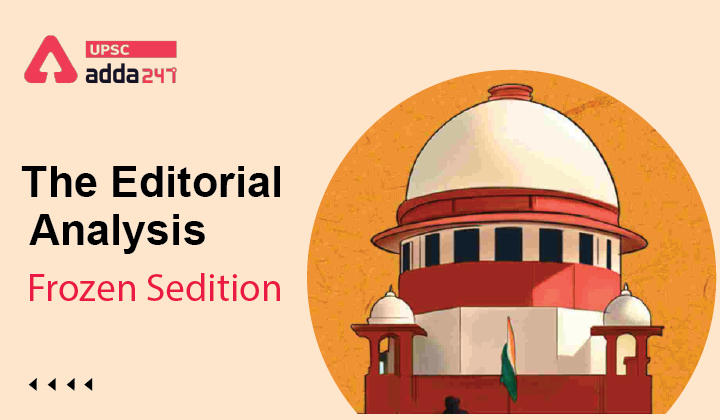Table of Contents
Sedition UPSC: Relevance
- GS 2: Separation of powers between various organs dispute redressal mechanisms and institutions.
Sedition law in India: Context
- Recently, Supreme Court has paused the law on sedition till the court hears the case next in July 2023.
Supreme court on sedition: Key points
- With this decision, the Supreme Court has effectively suspended the operation of the sedition provision in the country’s penal law.
- The Court has said that it expects that governments at the Centre and the States will not only retrict themselves in registering any fresh case of sedition under Section 124A of the IPC, but also will not continue with any investigation or taking any coercive measure under it.
- The hope and the expectation arise from the Union government’s own submission that it has decided to re-examine and reconsider the provision as part of the Prime Minister’s efforts to scrap outdated laws and compliance burdens.
- The Court has given liberty to the people to approach the jurisdiction courts if any fresh case is registered for sedition and cite in their support the present order, as well as the Union government’s stand.
Supreme court on sedition: Why important?
- The persistent misuse of sedition law has been recognised years ago.
- Earlier, courts have also pointed out that the police authorities were not heeding the limitation imposed a 1962 Constitution Bench of the Supreme Court on what constitutes sedition.
- The constitution bench in 1962 stated that the term sedition is applicable only to “acts involving intention or tendency to create disorder, or disturbance of law and order, or incitement to violence”.
- In practice, the police have been using the broad definition of sedition to book anyone who criticised the Government in strong and strident language.
Sedition supreme court: What next?
- If the apex court chooses to do overrule a decision rendered by a five-judge Bench 60 years ago, and strikes down Section 124A as an unconstitutional restriction on free speech, it may help the larger cause of preventing misuse of provisions relating to speech-based offences.
- However, the Government may choose to prevent such a situation by amending the Act so that the offence is narrowly defined to cover only acts that affect the sovereignty, integrity and security of the state, a recommendation given by experts.
Sedition law: Way forward
- The Government has already said that it was revisiting the provision on its own, now it must heed the spirit of the order and take effective steps to prevent its misuse.
Read current affairs for UPSC





 TSPSC Group 1 Question Paper 2024, Downl...
TSPSC Group 1 Question Paper 2024, Downl...
 TSPSC Group 1 Answer key 2024 Out, Downl...
TSPSC Group 1 Answer key 2024 Out, Downl...
 UPSC Prelims 2024 Question Paper, Downlo...
UPSC Prelims 2024 Question Paper, Downlo...
